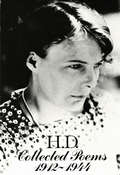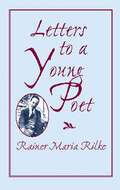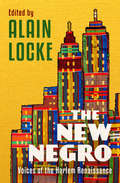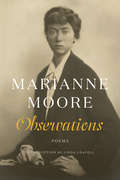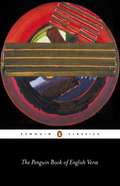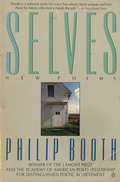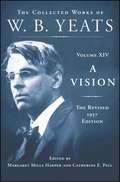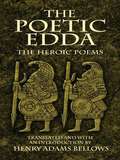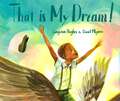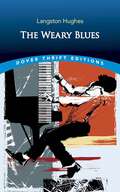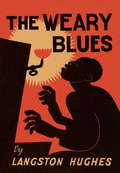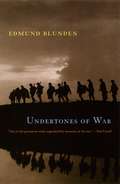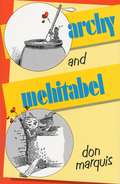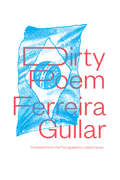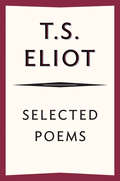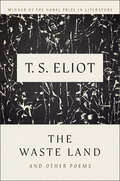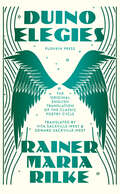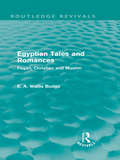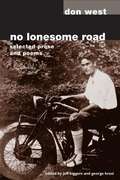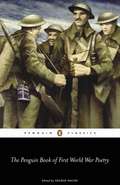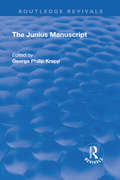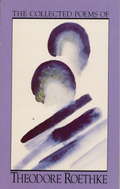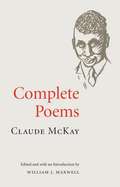- Table View
- List View
Barren Ground
by Ellen GlasgowSet in Virginia, Dorinda Oakley is a passionate, intelligent, and independent young woman struggling to define herself.
Collected Poems 1912-1944
by Hilda Doolittle Louis L. MartzThe Collected Poems 1912-1944 of H. D. brings together all the shorter poems and poetical sequences of Hilda Doolittle (1886-1961) written before 1945. Divided into four parts, this landmark volume, now available as a New Directions Paperbook, includes the complete Collected Poems of 1925 and Red Roses for Bronze (1931). Of special significance are the "Uncollected and Unpublished Poems (1912-1944)," the third section of the book, written mainly in the 1930s, during H. D.'s supposed "fallow" period. As these pages reveal, she was in fact writing a great deal of important poetry at the time, although publishing only a small part of it. The later, wartime poems in this section form an essential prologue to her magnificent Trilogy (1944), the fourth and culminating part of this book. Born in Pennsylvania in 1886, Hilda Doolittle moved to London in 1911 in the footsteps of her friend and one-time fiancé Ezra Pound. Indeed it was Pound, acting as the London scout for Poetry magazine, who helped her begin her extraordinary career, penning the words "H. D., Imagiste" to a group of six poems and sending them on to editor Harriet Monroe in Chicago. The Collected Poems 1912-1944 traces the continual expansion of H. D.'s work from her early imagistic mode to the prophetic style of her "hidden" years in the 1930s, climaxing in the broader, mature accomplishment of Trilogy. The book is edited by Professor Louis L. Martz of Yale, who supplies valuable textual notes and an introductory essay that relates the significance of H. D.'s life to her equally remarkable literary achievement.
Letters to a Young Poet
by Rainer Maria RilkeIn 1903, Rilke replied in a series of 10 letters to a student who had submitted some verses to the well-known Austrian poet for an assessment. Written during an important stage in Rilke's artistic development, these letters contain many of the themes that later appeared in his best works. Essential reading for scholars, poetry lovers.
The New Negro: Voices of the Harlem Renaissance (American Negro)
by Alain LockeA portrait of the vibrant world of 1920s Harlem, with writings by Langston Hughes, W. E. B. Du Bois, Zora Neale Hurston, Claude McKay, Walter White, and more. The Harlem Renaissance was a landmark period in African American history—a time when black poets, musicians, intellectuals, civil rights activists, and others changed the social and cultural landscape in enduring ways. Its influence went far beyond the confines of uptown New York City, as it incorporated voices from the Great Migration, in which African Americans moved north in vast numbers; and elevated artists and thinkers who would become iconic figures in not only Black history, but also American history. Now considered the definitive work of the Harlem Renaissance, The New Negro features fiction, poetry, and essays that shaped the era. &“A book of unusual interest and value.&” —The New York Times &“[Locke was] the godfather of the Harlem Renaissance.&” —Publishers Weekly &“Alain Locke is a critical—and complex—figure in any discussion of African-American intellectual history.&” —Kirkus Reviews
Observations: Poems
by Linda Leavell Marianne MooreMarianne Moore's Observations stands with T. S. Eliot's The Waste Land, Ezra Pound's early Cantos, and Wallace Stevens's Harmonium as a landmark of modern poetry. But to the chagrin of many admirers, Moore eliminated a third of its contents from her subsequent poetry collections while radically revising some of the poems she retained. This groundbreaking book has been unavailable to the general reader since its original publication in the 1920s.Presented with a new introduction by Linda Leavell, the author of the award-winning biography Holding On Upside Down: The Life and Work of Marianne Moore, this reissue of Observations at last allows readers to experience the untamed force of Moore's most dazzling innovations. Her fellow modernists were thrilled by her originality, her "clear, flawless" language--to them she was "a rafter holding up . . . our uncompleted building." Equally forceful for subsequent generations, Observations was an "eye-opener" to the young Elizabeth Bishop, its poems "miracles of language and construction." John Ashbery has called "An Octopus" the finest poem of "our greatest modern poet." Moore's heroic open-mindedness and prescient views on multiculturalism, biodiversity, and individual liberty make her work uniquely suited to our times.Impeccably precise yet playfully elusive, emotionally complex but stripped of all sentiment, the poems in Observations show us one of America's greatest poets at the height of her powers.
The Penguin Book of English Verse
by P J KeeganThis ambitious and revelatory collection turns the traditional chronology of anthologies on its head, listing poems according to their first individual appearance in the language rather than by poet.
Selves
by Philip BoothBooth's eighth poetry collection, with its evocations of compassion, tenderness and invading darkness, implies that redemption will come only from having loved well and wisely. PW remarked, Booth is a traveler keenly, almost mystically, aware that 'how you get there is where you'll arrive. '
Selves
by Philip BoothBooth's eighth poetry collection, with its evocations of compassion, tenderness and invading darkness, implies that redemption will come only from having loved well and wisely. Publishers Weekly remarked, "Booth is a traveler keenly, almost mystically, aware that 'how you get there is where you'll arrive.' "
A Vision: The Collected Works of W.B. Yeats Volume XIV
by William Butler Yeats Catherine E. Paul Margaret Mills HarperA new annotated edition of Yeats's indispensable, lifelong work of philosophy--a meditation on the connections between the imagination, history, and the metaphysical--this volume reveals the poet's greatest thoughts on the occult.First published in 1925, and then substantially revised by the author in 1937, A Vision is a unique work of literary modernism, and revelatory guide to Yeats's own poetry and thinking. Indispensable to an understanding of the poet's late work, and entrancing on its own merit, the book presents the "system" of philosophy, psychology, history, and the life of the soul that Yeats and his wife, George, received and created by means of mediumistic experiments from 1917 through the early 1920s. Yeats obsessively revised the original book that he wrote in 1925, and the 1937 version is the definitive version of what Yeats wanted to say. Now, presented in a scholarly edition for the first time by Yeats scholars Margaret Mills Harper and Catherine E. Paul, the 1937 version of A Vision is an important, essential literary resource and a must-have for all serious readers of Yeats.
The Poetic Edda: The Heroic Poems
by Henry Adams BellowsPassed down long ago from poet to poet and singer to singer in the great oral tradition of Scandinavia, this collection of heroic sagas explores a mythical world. Incorporating legends of Norse gods and heroes, great fires and floods, superhuman warriors and doomed lovers, these dramatic poems weave vivid portraits of powerful characters caught up in passion, ambition, and destiny. Filled with gripping conceptions of the world's creation and ultimate destruction, the verses chronicle the triumphs and tragedies of a lost mythological past, where words of wisdom and beauty echoed off the steel of waving swords.The hero poems of The Poetic Edda are literary monuments that have inspired such luminaries as Richard Wagner and J. R. R. Tolkien. This Dover edition, which includes exceptionally detailed and complete translations by Henry Adams Bellows, will continue to enchant new generations of readers. It is a companion to The Poetic Edda: The Mythological Poems, also available from Dover Publications.
That Is My Dream!: A picture book of Langston Hughes's "Dream Variation"
by Langston Hughes&“Dream Variation,&” one of Langston Hughes's most celebrated poems, about the dream of a world free of discrimination and racial prejudice, is now a picture book stunningly illustrated by Daniel Miyares, the acclaimed creator of Float. To fling my arms wide In some place of the sun, To whirl and to dance Till the white day is done…. Langston Hughes's inspiring and timeless message of pride, joy, and the dream of a better life is brilliantly and beautifully interpreted in Daniel Miyares's gorgeous artwork. Follow one African-American boy through the course of his day as the harsh reality of segregation and racial prejudice comes into vivid focus. But the boy dreams of a different life—one full of freedom, hope, and wild possibility, where he can fling his arms wide in the face of the sun. Hughes's powerful vision, brought joyously to life by Daniel Miyares, is as relevant—and necessary—today as when it was first written.
The Weary Blues (Dover Thrift Editions: Black History)
by Langston HughesThe Weary Blues is Langston Hughes's first published collection of poems, immediately celebrated as a tour de force upon its release. Over ninety years after its publication, it remains a critically acclaimed literary work and still evokes a fresh, contemporary feeling and offers a powerful reflection of the Black experience. From the title poem "The Weary Blues," echoing the sounds of the blues, to "Dream Variation," ringing with joyfulness, to the "Epilogue" that mimics Walt Whitman in its opening line, "I, too, sing America," Hughes writes clearly and colorfully, and his words remain prophetic and relevant today.
The Weary Blues
by Langston HughesNearly ninety years after its first publication, this celebratory edition of The Weary Blues reminds us of the stunning achievement of Langston Hughes, who was just twenty-four at its first appearance. Beginning with the opening "Proem" (prologue poem)--"I am a Negro: / Black as the night is black, / Black like the depths of my Africa"--Hughes spoke directly, intimately, and powerfully of the experiences of African Americans at a time when their voices were newly being heard in our literature. As the legendary Carl Van Vechten wrote in a brief introduction to the original 1926 edition, "His cabaret songs throb with the true jazz rhythm; his sea-pieces ache with a calm, melancholy lyricism; he cries bitterly from the heart of his race . . . Always, however, his stanzas are subjective, personal," and, he concludes, they are the expression of "an essentially sensitive and subtly illusive nature." That illusive nature darts among these early lines and begins to reveal itself, with precocious confidence and clarity. In a new introduction to the work, the poet and editor Kevin Young suggests that Hughes from this very first moment is "celebrating, critiquing, and completing the American dream," and that he manages to take Walt Whitman's American "I" and write himself into it. We find here not only such classics as "The Negro Speaks of Rivers" and the great twentieth-century anthem that begins "I, too, sing America," but also the poet's shorter lyrics and fancies, which dream just as deeply. "Bring me all of your / Heart melodies," the young Hughes offers, "That I may wrap them / In a blue cloud-cloth / Away from the too-rough fingers / Of the world."From the Hardcover edition.
Undertones of War
by Edmund Blunden“I took my road with no little pride of fear; one morning I feared very sharply, as I saw what looked like a rising shroud over a wooden cross in the clustering mist. Horror! But on a closer study I realized that the apparition was only a flannel gas helmet. . . . What an age since 1914!” In Undertones of War, one of the finest autobiographies to come out of World War I, the acclaimed poet Edmund Blunden records his devastating experiences in combat. After enlisting at the age of twenty, he took part in the disastrous battles at the Somme, Ypres, and Passchendaele, describing them as “murder, not only to the troops but to their singing faiths and hopes. ” All the horrors of trench warfare, all the absurdity and feeble attempts to make sense of the fighting, all the strangeness of observing war as a writer—of being simultaneously soldier and poet—pervade Blunden’s memoir. In steely-eyed prose as richly allusive as any poetry, he tells of the endurance and despair found among the men of his battalion, including the harrowing acts of bravery that won him the Military Cross. Now back in print for American readers, the volume includes a selection of Blunden’s war poems that unflinchingly juxtapose death in the trenches with the beauty of Flanders’s fields. Undertones of War deserves a place on anyone’s bookshelf between Siegfried Sassoon’s poetry and Robert Graves’s Goodbye to All That.
Archy and Mehitabel
by Don MarquisThe now classic tale of Archy the cockroach and Mehitabel the cat in her ninth life. First published in 1927, this free verse poem has become an essential part of American literature.
Dirty Poem
by Leland Guyer Ferreira GullarConsidered the greatest long poem in 20th century Brazilian poetry, Ferreira's Gullar's Dirty Poem was written as a response to the Brazilian dictatorship that put him in exile and murdered thousands. Written in 1975 in Buenos Aires when Ferreira Gullar was in political exile from the Brazilian dictatorship, Dirty Poem is an epic poem that amid life events traces the author's political and artistic evolution and is by most accounts the most important long poem of contemporary Brazilian literature. Scholar and critic Otto Maria Carpeaux wrote: "Dirty Poem deserves to be called 'National Poem' because it embodies all of the experiences, victories, defeats, and hopes in the life of the Brazilian citizen." It is a hypnotic work that draws on the poet's memory of adolescence in the seaside city of Sao Luís do Maranhao during World War II and deals openly with the "dirty" shamefulness of a socio-economic system that abuses its citizens with poverty, sexism, greed, and fear.
Selected Poems
by T. S. EliotChosen by Eliot himself, the poems in this volume represent the poet's most important work before Four Quartets. Included here is some of the most celebrated verse in modern literature--"The Love Song of J. Alfred Prufrock," "Gerontion," "The Waste Land," "The Hollow Men," and "Ash Wednesday"--as well as many other fine selections from Eliot's early work.
The Waste Land and Other Poems (Vintage Classics Ser.)
by T. S. Eliot"For many successive generations now, 'The Waste Land,' 'The Love Song of J. Alfred Prufrock,' and 'Four Quartets' have continued to excited readers and to inspire young poets. Teenagers still discover his work with a thrill of wonder and recognition. Eliot's unique power, his understanding of interrelated beauty and squalor, freshness and despair, survives academic fashions, survives all interpretations, survives even his own dicta and formulations. He is one of the great poets." --Robert Pinsky, former Poet Laureate and author of Singing School "An exalted nightmare, one of the great poems of the 20th century." --Edward Hirsch, author of How to Read a Poem (and Fall in Love with Poetry) and A Poet's Glossary
Duino Elegies, Deluxe Edition: The original English translation of Rilke's landmark poetry cycle, by Vita and E dward Sackville-West - reissued for the first time in 90 years
by Rainer Maria RilkeThe first-ever English translation of Rilke&’s landmark poetry cycle, by Vita and Edward Sackville-West – reissued for the first time in 90 yearsIn 1931, Virginia and Leonard Woolf&’s Hogarth Press published a small run of a beautiful edition of Rainer Maria Rilke&’s Duino Elegies, in English translation by the writers Vita and Edward Sackville-West. This marked the English debut of Rilke&’s masterpiece, which would eventually be rendered in English over 20 times, influencing countless poets, musicians and artists across the English-speaking world. Published for the first time in 90 years, the Sackville-Wests&’ translation is both a fascinating historical document and a magnificent blank-verse rendering of Rilke&’s poetry cycle. Featuring a new introduction from critic Lesley Chamberlain, this reissue casts one of European literature&’s great masterpieces in fresh light.
Egyptian Tales and Romances: Pagan, Christian and Muslim (Routledge Revivals)
by E. A. BudgeSir E. A. Wallis Budge (1857-1934) was Keeper of the British Museum’s department of oriental antiquities from 1894 until his retirement in 1924. Carrying out many missions to Egypt in search of ancient objects, Budge was hugely successful in collecting papyri, statues and other artefacts for the trustees of the British Museum: numbering into the thousands and of great cultural and historical significance. Budge published well over 100 monographs, which shaped the development of future scholarship and are still of great academic value today, dealing with subjects such as Egyptian religion, history and literature. First published in 1931, Egyptian Tales and Romances examines the historical and religious romances of the Egyptians from the early dynastic period to the twentieth century. Budge demonstrates Egypt’s transition from Paganism to Christianity, and finally to Islam, through tales and stories carefully transcribed and translated. Part I contains historical romances written on papyrus and stone, whilst parts II and III are derived largely from Coptic and Muslim manuscript sources. Including detailed illustrations and photographs, this fascinating classic work will be of interest to academics and students of Egyptian folklore, archaeology and history, as well as the general inquisitive reader.
No Lonesome Road: SELECTED PROSE AND POEMS
by George Brosi Don West Jeff BiggersThis is the first book to celebrate the life and writing of one of the most charismatic Southern leaders of the middle twentieth century, Don West (1906-1992). West was a poet, a pioneer advocate for civil rights, a preacher, a historian, a labor organizer, a folk-music revivalist, an essayist, and an organic farmer. He is perhaps best known as an educator, primarily as cofounder of the Highlander Folk School in Tennessee and founder of the Appalachian South Folklife Center in West Virginia. In his old age, West served as an elder statesman for his causes. No Lonesome Road allows Don West to speak for himself. It provides the most comprehensive collection of his poetry ever published, spanning five decades of his literary career. It also includes the first comprehensive and annotated collection of West's nonfiction essays, articles, letters, speeches, and stories, covering his role at the forefront of Southern and Appalachian history, and as a pioneer researcher and writer on the South's little-known legacy of radical activism. Drawing from both primary and secondary sources, including previously unknown documents, correspondence, interviews, FBI files, and newspaper clippings, the introduction by Jeff Biggers stands as the most thorough, insightful biographical sketch of Don West yet published in any form. The afterword by George Brosi is a stirring personal tribute to the contributions of West and also serves as a thoughtful reflection on the interactions between the radicals of the 1930s and the 1960s. The best possible introduction to his extraordinary life and work, this annotated selection of Don West's writings will be inspirational reading for anyone interested in Southern history, poetry, religion, or activism.
The Penguin Book of First World War Poetry
by George WalterThis anthology reflects the diversity of voices it contains: the poems are arranged thematically and the themes reflect the different experiences of war not just for the soldiers but for those left behind. This is what makes this volume more accessible and satisfying than others. In addition to the established canon there are poems rarely anthologised and a selection of soldiers' songs to reflect the voices of the soldiers themselves.
Revival: The Junius Manuscript (1931) (Routledge Revivals)
by George Philip KrappThis book is the first volume in a collective edition, the plan of which includes all the surviving records of Anglo-Saxon poetry. The main body of Anglo-Saxon poetry as it has come down to us is contained in four important miscellany manuscripts, the Junius Manuscript, the Vercelli Book, the Exeter Book, and the Beowulf Manuscript, each of which will constitute a separate volume in this edition. The remaining minor and more or less scattered examples of Anglo-Saxon poetry will be grouped together, in a volume of volumes of their own.
The Collected Poems of Theodore Roethke
by Theodore RoethkeThis paperback edition contains the complete text of Roethke's seven published volumes plus sixteen previously uncollected poems. Included are his Pulitzer Prize and National Book Award winners The Walking, Words for the Wind, and The Far Field.From the Trade Paperback edition.
Complete Poems
by William Maxwell Claude MckayContaining more than three hundred poems, including nearly a hundred previously unpublished works, this unique collection showcases the intellectual range of Claude McKay (1889-1948), the Jamaican-born poet and novelist whose life and work were marked by restless travel and steadfast social protest. McKay's first poems were composed in rural Jamaican creole and launched his lifelong commitment to representing everyday black culture from the bottom up. Migrating to New York, he reinvigorated the English sonnet and helped spark the Harlem Renaissance with poems such as "If We Must Die." After coming under scrutiny for his communism, he traveled throughout Europe and North Africa for twelve years and returned to Harlem in 1934, having denounced Stalin's Soviet Union. By then, McKay's pristine "violent sonnets" were giving way to confessional lyrics informed by his newfound Catholicism. McKay's verse eludes easy definition, yet this complete anthology, vividly introduced and carefully annotated by William J. Maxwell, acquaints readers with the full transnational evolution of a major voice in twentieth-century poetry.

